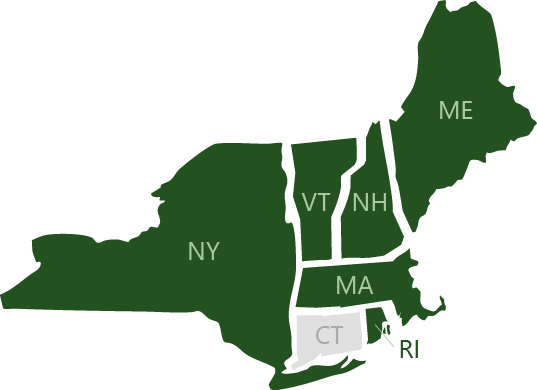Navigation
Resources and guidance for the Farm to School Compass
Overview of the CT Fresh Ed Compass
This tool is designed to guide your LEA's Farm to School journey and help identify opportunities to strengthen fresh, local connections within your school community.
The Compass is organized into three sections: Procurement, Spending, and Best Practices and Needs Assessment.
- Most questions in the Procurement and Spending sections can be answered by the food service director.
- The Best Practices and Needs Assessment section covers a wider range of topics including cafeteria operations, classroom activities, school gardens, and community engagement. This section may require input from additional staff beyond the food service director. Please review the preview questions and collaborate with the appropriate team members as needed.
Below, you'll find the information to gather before starting. Completing the Compass should take approximately 60 minutes.

Getting Ready
We recommend reading through the questions using the “Preview Questions” button to help you identify which documents you need to complete this Compass.
Preview QuestionsFor all LEAs:
Follow these steps to get started with the CT Fresh Ed Compass:
-
Log in to get startedClick on the "Log in" button to access the assessment platform.
-
Create an accountCreate an account using your email and password if you don't already have one.
-
Navigate to My LogbookThis will direct you to "My Logbook," where you can locate your Compass by clicking on the "Locate your Compass" button.
-
Select your location and sponsorYou will see a screen where you will select the county where your LEA is located and sponsor name.
-
Enter your passcodeYour passcode to access your Compass is the same as your sponsor ID.
-
Begin your assessmentOnce you submit your information, you can click the "Begin Compass" button or resume a previously created Compass.
For LEAs with interschool agreement:
Follow these steps to get started with the CT Fresh Ed Compass:
-
Log in to get startedClick on the "Log in" button to access the assessment platform.
-
Create an accountCreate an account using your email and password if you don't already have one.
-
Navigate to My LogbookThis will direct you to "My Logbook," where you can locate your Compass by clicking on the "Locate your Compass" button.
-
Select your location, sponsor, and LEAYou will see a screen where you will select the county where your LEA is located and sponsor name. If you have an interschool agreement, you will also have the option to select your specific LEA.
-
Enter your passcodeYour passcode to access your Compass will be provided by CSDE.
-
Begin your assessmentOnce you submit your information, you can click the "Begin Compass" button or resume a previously created Compass.
Here is a list of staff members that are recommended to respond and documents that you may need to gather to complete the Compass.
| Resource Type |
Section 1: Procurement Section 2: Spending |
Section 3: Best Practices & Needs Assessment | |||
|---|---|---|---|---|---|
| Cafeteria | Classroom | Community | Coordination | ||
| Recommended Respondent |
|
|
|
|
|
| Recommended Documentation |
|
|
|||
We recommend using the Staff Engagement Guide, together with the Best Practices and Needs Assessment preview questions, to encourage staff across your LEA to collaborate on the Compass.
These are definitions for keywords used throughout the Compass.
| Term | Definition |
|---|---|
| Minimally Processed Food | Minimally processed foods have been slightly altered so they can be more easily stored, prepared, and eaten; this processing level does not substantially change the nutritional content of the food, and the food is still recognizable in its shape or contents. It includes sliced apples, frozen blueberries, shredded cabbage, marinara sauce and apple cider, for example. |
| Local (CT Only) |

"Locally sourced food" means produce and other farm products
that have a traceable point of origin within Connecticut
that
are grown or produced at, or sold by, a local farm and
includes,
but is not limited to, value-added dairy, fish, pork, beef,
poultry, eggs, fruits, vegetables and minimally processed
foods.
|
| Regional (Not CT; NY, MA, RI, VT, NH, ME) |

"Regionally sourced food" means produce and other farm
products
that have a traceable point of origin within New York,
Massachusetts, Rhode Island, Vermont, New Hampshire or Maine
that are grown or produced at, or sold by, a regional farm
and
includes, but is not limited to, value-added dairy, fish,
pork,
beef, poultry, eggs, fruits, vegetables and minimally
processed
foods.
|
| Traceable point of origin | A documentation that identifies the origin of the product, including the name and town of the farm that grew/produced it. |
| Local Educational Agency (LEA) | Is a public board of education or other public authority legally constituted within a state for direction of public elementary or secondary schools of a school district or other political subdivision. |